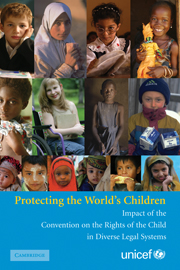 Protecting the World's Children
Protecting the World's Children Book contents
- Frontmatter
- Contents
- Acknowledgements
- Foreword
- Contributors
- Introduction and Overview
- 1 A Comparative Study of the Impact of the Convention on the Rights of the Child: Law Reform in Selected Common Law Countries
- 2 A Comparative Study of the Impact of the Convention on the Rights of the Child: Law Reform in Selected Civil Law Countries
- 3 A Comparative Perspective of the Convention on the Rights of the Child and the Principles of Islamic Law: Law Reform and Children's Rights in Muslim Jurisdictions
- 4 Law Reform and Children's Rights in Plural Legal Systems: Some Experiences in Sub-Saharan Africa
- Index
- References
4 - Law Reform and Children's Rights in Plural Legal Systems: Some Experiences in Sub-Saharan Africa
Published online by Cambridge University Press: 30 October 2009
- Frontmatter
- Contents
- Acknowledgements
- Foreword
- Contributors
- Introduction and Overview
- 1 A Comparative Study of the Impact of the Convention on the Rights of the Child: Law Reform in Selected Common Law Countries
- 2 A Comparative Study of the Impact of the Convention on the Rights of the Child: Law Reform in Selected Civil Law Countries
- 3 A Comparative Perspective of the Convention on the Rights of the Child and the Principles of Islamic Law: Law Reform and Children's Rights in Muslim Jurisdictions
- 4 Law Reform and Children's Rights in Plural Legal Systems: Some Experiences in Sub-Saharan Africa
- Index
- References
Summary
INTRODUCTION
The ratification of an international human rights treaty by a State is meant to confer rights on people within that State. It also creates an obligation on successive governments to realize those rights within the country, and at the national level. The UN Convention on the Rights of the Child (CRC), as one of the most recent international treaties, introduces a different dimension by adopting some new approaches to the content of rights, as well as obligations created under it. This has posed both challenges and opportunities in regard to using the legal system to implement the rights guaranteed under the Convention.
The CRC sometimes uses language that is familiar to many legal systems by imposing the obligation to realize rights on different agencies of the State. For instance,Article 3 refers to the obligation of public social welfare institutions, courts of law, administrative authorities or legislative bodies to make the best interests of the child a primary consideration in their actions concerning children. Similarly, Article 4 requires States parties to undertake “legislative administrative and other measures” for the implementation of the rights of the child. The emphasis on the State and its agencies as the key duty bearers, as well as the role of legislation in realizing rights, conforms to the traditional view that adopting a law or legal reform is an isolated act of the State.
- Type
- Chapter
- Information
- Protecting the World's ChildrenImpact of the Convention on the Rights of the Child in Diverse Legal Systems, pp. 209 - 264Publisher: Cambridge University PressPrint publication year: 2007


